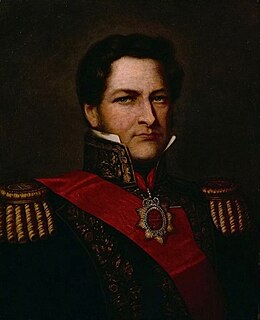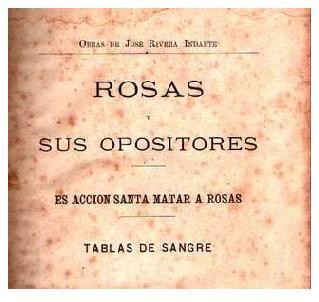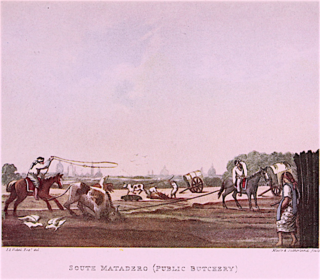 W
WJuan Manuel de Rosas, nicknamed "Restorer of the Laws", was a politician and army officer who ruled Buenos Aires Province and briefly the Argentine Confederation. Although born into a wealthy family, Rosas independently amassed a personal fortune, acquiring large tracts of land in the process. Rosas enlisted his workers in a private militia, as was common for rural proprietors, and took part in the disputes that led to numerous civil wars in his country. Victorious in warfare, personally influential, and with vast landholdings and a loyal private army, Rosas became a caudillo, as provincial warlords in the region were known. He eventually reached the rank of brigadier general, the highest in the Argentine Army, and became the undisputed leader of the Federalist Party.
 W
WThe naval Battle of Vuelta de Obligado took place on the waters of the Paraná River on 20 November 1845, between the Argentine Confederation, under the leadership of Juan Manuel de Rosas, and a combined Anglo-French fleet. The action was part of the larger Anglo-French blockade of the Río de la Plata. Although the attacking forces broke through the Argentine naval defenses and overran the land defenses, the battle proved that foreign ships could not safely navigate Argentine internal waters against its government's wishes. The battle also changed political feeling in South America, increasing support for Rosas and his government.
 W
WBlood tables: it is a holy action to kill Rosas is an 1843 Argentine libelle written by José Rivera Indarte against the governor of Buenos Aires, Juan Manuel de Rosas. It details 465 purported crimes committed by Rosas or the Popular Restoring Society; later editions increased the number by 22,560. The book was used as a primary source by the early historiography of Juan Manuel de Rosas; modern historians consider its figures to be inflated.
 W
WThe Curved saber of San Martín is an historic weapon used by José de San Martín.
 W
WThe Desert Campaign (1833–34) was a military campaign in Argentina led by Juan Manuel de Rosas against the indigenous people of the southern Pampas and northern Patagonia. The campaign was later followed by the Conquest of the Desert, which took place in the 1870s and 1880s.
 W
WMaría de la Encarnación Ezcurra was an Argentine politician, wife of Juan Manuel de Rosas.
 W
WFernando García del Molino was a Chilean-born Argentine portrait painter, miniaturist and lithographer. Many of his portraits were done from photographs or daguerrotypes.
 W
WThe historiography of Juan Manuel de Rosas is highly controversial. Most Argentine historians take an approach either for or against him, a dispute that influenced much of the whole historiography of Argentina.
 W
WThe National Sovereignty Day is a national public holiday of Argentina, celebrated during November 20. It commemorates the Battle of Vuelta de Obligado, when a small Argentine army stood against an Anglo-French navy that broke into the Paraná River on November 20, 1845, against the will of the Argentine Confederation. Although the battle itself ended with an Argentine defeat, the losses of Britain and France in the whole military campaign were so high that both countries were forced to the bargaining table and signed a treaty with Juan Manuel de Rosas. The day was enacted as a national observance in 1974, following a request from the revisionist historian José María Rosa, and promoted into a national holiday in 2010.
 W
WJuan Manuel de Rosas was Governor of Buenos Aires Province during the Argentine Civil Wars. Deposed during the battle of Caseros, he spent his later life in exile in Southampton, England, where he died on March 14, 1877. He was buried at the Southampton Old Cemetery, and after a number of failed attempts he was repatriated to Argentina and taken to La Recoleta Cemetery, his current grave location.
 W
WThe Revolution of the Restorers was a rebellion that took place in Buenos Aires in 1833. The governor Juan Ramón Balcarce was ousted from office and replaced by Juan José Viamonte. The rebellion was motivated by actions taken by Balcarce against former governor Juan Manuel de Rosas. Rosas was absent from the city by that time, but the rebellion was supported by his wife Encarnación Ezcurra. It strengthened the political power of Rosas, who would become governor a second time a short time later.
 W
WThe Slaughter Yard, is a short story by the Argentine poet and essayist Esteban Echeverría (1805-1851). It was the first Argentine work of prose fiction. It is one of the most studied texts in Latin American literature. Written in exile and published posthumously in 1871, it is an attack on the brutality of the Federalist regime of Juan Manuel Rosas and his parapolice thugs, the Mazorca.
 W
WThe sum of public power is a legal term from Argentina, included in its constitution. It represents the sum of the three powers, and deems the complete delegation of them into the executive power as a crime of high treason.